11 Best Dietary Modifications for Obesity That Actually Work Resulting Weight Loss
Reviewed by: Dr. T S Deepthi Sarojini | Author: Manoja Kalakanti
Obesity is a complex disease that has reached epidemic proportions in many parts of the globe. With the advent of technology, modern-day lifestyle and dietary habits, the cases of obesity have sky-rocketed over the turn of the century. Several factors can cause obesity, such as psychological factors like stress or anger, hormonal imbalance, pregnancy, socio-economic status, increasing urbanization, and hereditary predispositions. But diet is considered to be the most vital aspect of our life that leads to obesity. But there are many diet fads out there that do more damage than good. So, we’ll focus on a diet for obesity that actually works! Therefore, we will talk about the 11 best dietary modifications for obesity.
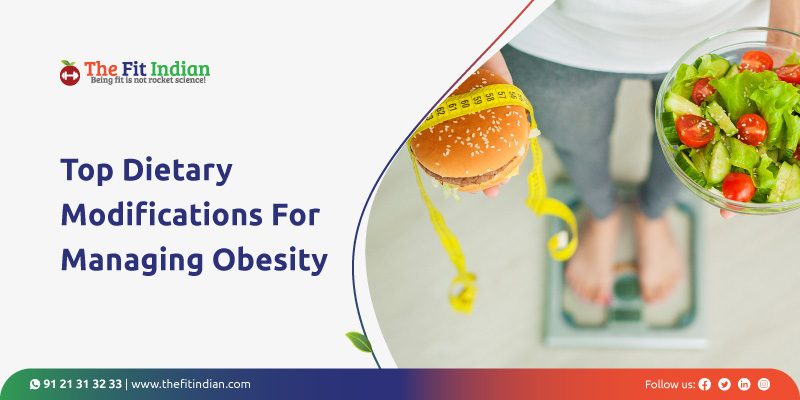
A simple modification in your diet can go a long way in the successful dietary management of obesity. Before we head to the modifications, let’s look at why diet is so important in obesity management and even more important than exercise.
Dietary Modifications For Obesity – Why Diet is More Important Than Exercise For Weight Loss
The first thing that comes to mind when talking about weight loss is exercise. Most people tend to equate weight loss with exercise. While exercise does play a key role in combating obesity, it is the diet that takes the cakes as the most crucial weapon in a weight loss plan. It is the most critical part of all the lifestyle changes to lose weight. But why is diet so vital? And how is it even more important than exercise?
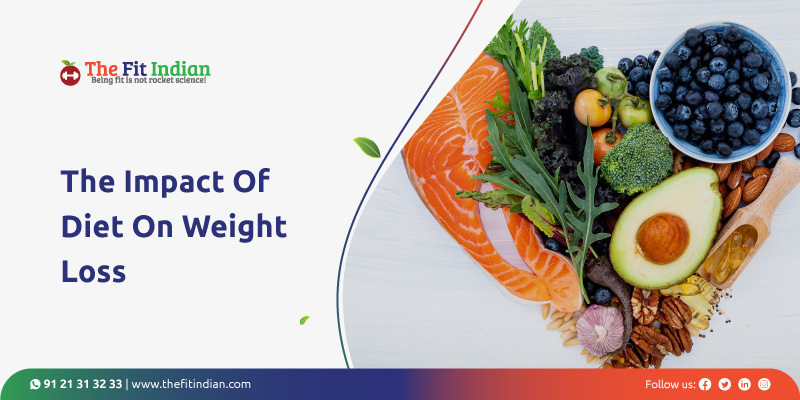
The importance of eating patterns for weight loss cannot be stressed enough. In fact, diet is more important than exercise when it comes to losing those pounds. Several studies, too, have backed this claim. Even if you consistently exercise, it won’t show any results if you follow an unhealthy diet. One bad meal can sabotage your entire fitness plan. Piling on the calories through unhealthy food can be surprisingly effortless. So, keeping an eye on your plate is more vital than the miles you run.
By the simple act of omitting certain foods that are high in fats, sugar, refined carbs and calories, you can arrest weight gain. There is another unintended result of exercise; a workout session could stir up your appetite, thus tempting you to gorge on a heavy meal. Burning calories is a more demanding and challenging task than not piling up calories through a proper diet. All things considered; exercise is essential but just not as important as diet in your weight-loss journey.
Read on to find out the best dietary modifications that can help tackle obesity.
Top 11 Effective Dietary Modifications for Obesity
For better obesity control, you must combine diet with exercise and advice from health experts. You must also keep in mind that the results may vary from one individual to another. It may also take a lot of time and effort, so you must be patient and consistently follow the diet plan.
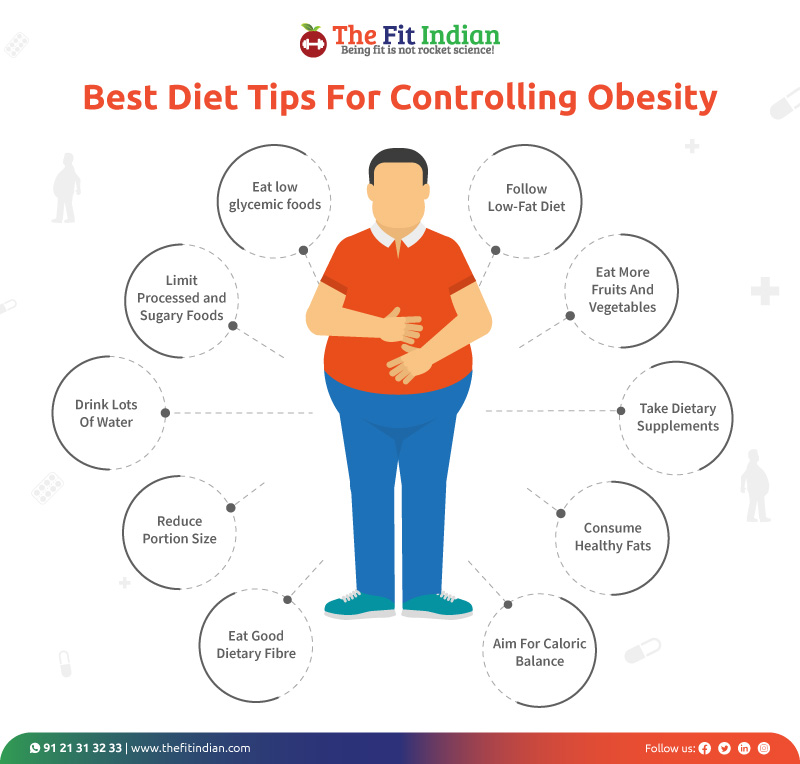
Remember that the diet plan for an obese person focuses on overall health and not just lowering the numbers on the weight scale. Any weight loss regimen must always focus on healthy weight loss with the proper nutrition. Without further ado, let’s look at the 11 effective dietary modifications for obesity.
1. Consume More Vegetables and Fruits
The advice you have been hearing all your life about adding more fruits and vegetables into your diet was the best dietary advice.
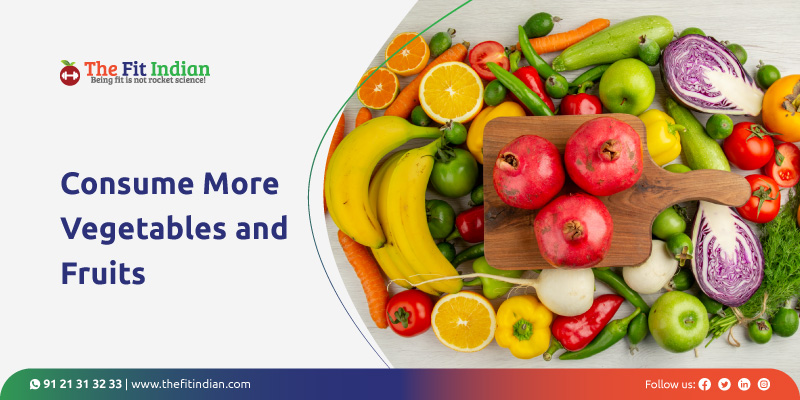
Fruits and vegetables are loaded with nutrients and are key to your optimal health. They satiate hunger without significantly increasing your caloric intake. Besides, they are also rich in water content.
Sources:
Fruits: Papaya, mango, kiwi, pears, peach, strawberries, watermelon and orange. Moderate consumption of bananas, grapes, sapota and, pineapple
Vegetables: Broccoli, cabbage, brinjal, potatoes, tomato, peppers of all colours
Benefits:
- Fruits and vegetables contain many of the essential vitamins and minerals that your body cannot produce on its own
- They make you feel healthy and energised
- Replacing higher-calorie foods with low-calorie fruits and vegetables can lead to a lower calorie intake.
2. Eat Low-Glycemic Foods
A diet rich in high glycemic foods such as refined grains and sugar is associated with weight gain and other conditions such as diabetes. Low glycemic foods, on the other hand, are known to help in weight loss. They are also beneficial for controlling diabetes.
Sources:
- Fruits: Apples, oranges, kiwi, pears, grapes, melon, peaches and plums
- Vegetables: Cabbage, cauliflower, eggplant, green beans, carrots, peppers, onions, asparagus, and spinach
- Dairy and eggs: Low-fat yoghurt, cheddar, cotton cheese and ricotta and regular eggs
- Meat: Chicken breast, crabs, lobster, salmon, sardines and tuna.
- Grains and Bread: Quinoa, brown rice, millets, barley, brown bread and rye
Benefits:
- Low-glycemic foods such as bread, cereals, dairy products, fruits and vegetables are carbohydrates that affect your blood sugar levels
- Studies show that these foods can be good for you in many ways
- Low-glycemic foods help with weight loss and blood sugar. This may help lower the risk of conditions like type 2 diabetes and heart diseases
3. Reduce Processed and Sugary Foods
Processed and sugary foods pile on the calories easily. Since sugar gets digested quickly, it does not satiate your hunger for long, making you eat more.
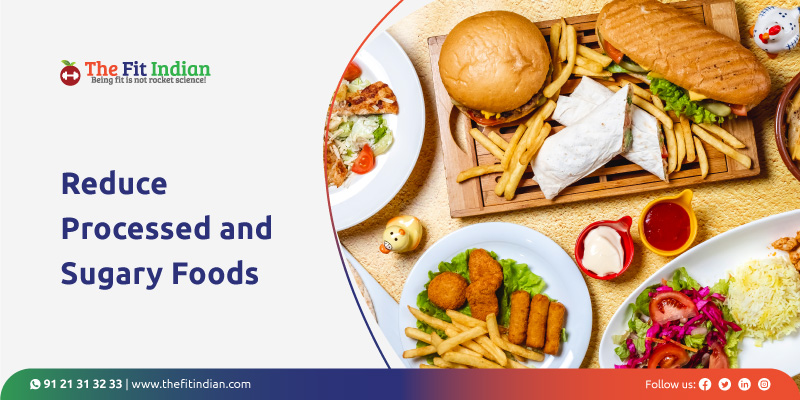
These foods also lack the nutrients required for optimal health and can cause other health problems like diabetes and heart diseases.
Sources:
Frozen and canned vegetables and fruits (dried, canned) and frozen beans and legumes like lentils and chickpeas whole grains like oats, brown rice, barley and quinoa, and bagged spinach.
Benefits:
- Boosts brain health
- Clears skin
- Provides energy
- Improves sleep
- Reduces cravings
4. Drink Enough Water
Several studies have shown that drinking water helps in weight loss. It helps burn calories and also fills your stomach, thus reducing appetite. Water is also essential for your health and has many other benefits.
Benefits:
- Maintains youthfulness
- Expels toxins
- Carries oxygen and vital nutrients to the cells
- Helps in weight loss
- Maintains body temperature
- Keeps all organs active
5. Reduce Portion Size
Reducing the amount of food you eat will reduce your calorie intake, thus helping you lose weight.
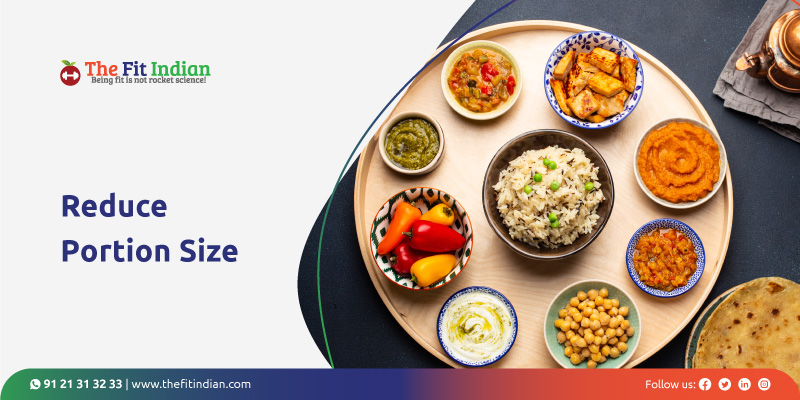
Combine it by drinking a lot of water and eating satiating whole foods.
Here are ways to measure food quantity:
- Palm – 3 ounce – Poultry, meat and fish
- Fist (1 cup) – Rice, pasta, fruits, veggies, and ice cream (low-fat) and nuts
- Cupped hand (½ cup) – Beans and potatoes
- 2 cupped ounce – Makhana, popcorns
- Thumb – Cottage cheese, ghee
- Thumb tip – Cooking oil, butter
Benefits:
- Waste minimisation
- Controlled food choices
- Equal portioning in a meal
- Meeting nutritional needs
6. Good Energy Balance – Intake (Calorie from food)
Weight gain will occur if your energy intake through calories is higher than the energy expenditure. Maintaining a good energy balance is essential in your weight-loss journey.
Sources: Low-carbohydrate foods, healthy fats, fruits, vegetables and lean proteins. Hydrating body with water
Benefits:
- You get insight into calorie consumption
- You eat smaller portions
- You make better choices
7. Output (Calorie burned by the body)
This is simple math; you’ll gain more weight if the calorie intake is more than the calories you burn.
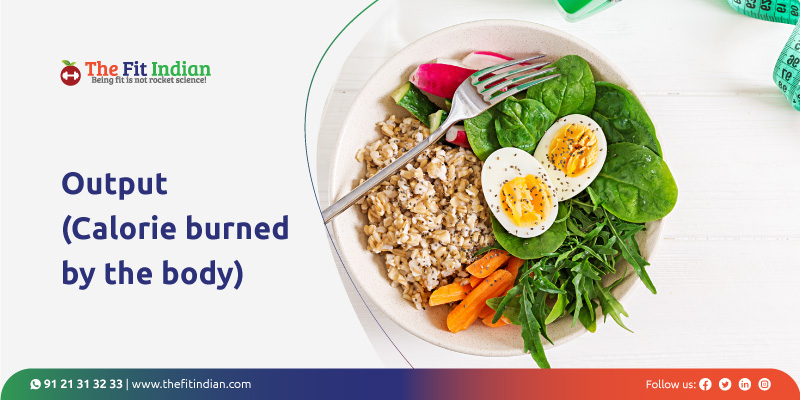
Burning calories through exercise becomes much easier if you consume healthy food that isn’t high in calories.
Sources: Low carbohydrates, good fats, fruits, vegetables, lean proteins. Hydrating body with water.
Benefits:
- Maintains healthy weight
- Improves metabolism
- Lowers the risk conditions associated with obesity
8. Dietary Supplements
While diet and exercise are the two most critical aspects of a weight loss plan, dietary supplements can give the extra boost. They can provide key nutrients and improve your health and keep many health issues at bay.
Sources: Omega-3 Fatty acids, calcium, iron, folic acids, vitamin c and multivitamins
Benefits:
- Ensure that you get the required amount of essential nutrients
- Helps in reducing the risk of diseases
- Supports organs
- Helps in weight loss
- Improves overall health
9. Consume Less “Bad” Fat and More “Good” Fat
Consumption of unhealthy fats is one of the primary reasons for weight gain.

All you need to do is opt for the healthier oil. This simple switch can improve your health.
- Avoid saturated and trans fats, deeply fried items, mutton and beef
- Include good HDL fats in daily diet, consume more grilled, baked, boiled foods
Benefits:
- Will reduce the risk factors of obesity, cholesterol, hypertension, higher BMI and other health conditions
- Including good fats has major benefits to overall health.
10. Low-fat Diet
Dietary fats cause you to eat more; they do not have a good satiating effect and are rich in calories. But not all fats are bad; you can eat healthy fats instead of unhealthy ones. A diet low in fat can help you shed those extra pounds.
Sources:
- Cereals, grains, and pasta
- Protein-rich foods
- Pumpkin seeds
- Healthy fats – when considering a low-fat diet, it is important to remember that not all fats are unhealthy
- Fruits and vegetables
Benefits:
- Reduces body fat
- Lowers the risk of heart disease
- High in antioxidants
- Lowers the blood sugar levels
11. Good Dietary Fibre
Fibre’s greatest strength as a weight-loss remedy is its ability to make you feel full.
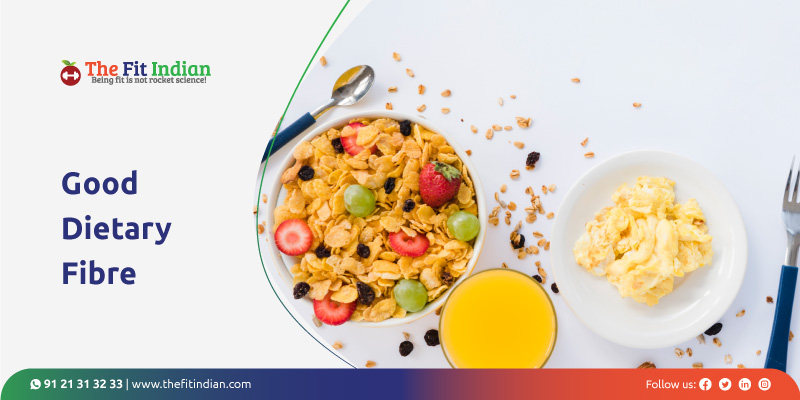
It reduces your appetite and is also beneficial for people with diabetes.
Sources: Brown rice, whole wheat bread, barley, ragi, oats, quinoa, rice flakes
Benefits:
- Boosts digestion
- Aids weight loss
- Relieves constipation
- Improves cholesterol levels
Now that you know about the diet for an obese person, let’s understand the other key lifestyle changes necessary to combat this condition.
It has been clearly established that diet plays the most crucial role in a weight loss program. But, the critical role of other lifestyle aspects such as exercise cannot be merely brushed off. Your overall lifestyle is often the reason for unhealthy weight gain. A modification of your lifestyle can pay huge dividends in tackling the scourge of obesity.
Combine a healthy eating lifestyle program along with physical activity and other lifestyle modifications to transform from fat to fit.
Dietary Guidelines For COVID-19 Patients With Obesity
Obesity increases the risk of complications and even mortality in COVID-19 patients. This is one more important reason to keep your weight under control. This is not a complete diet plan; for a comprehensive and customised plan, consult a nutritionist.
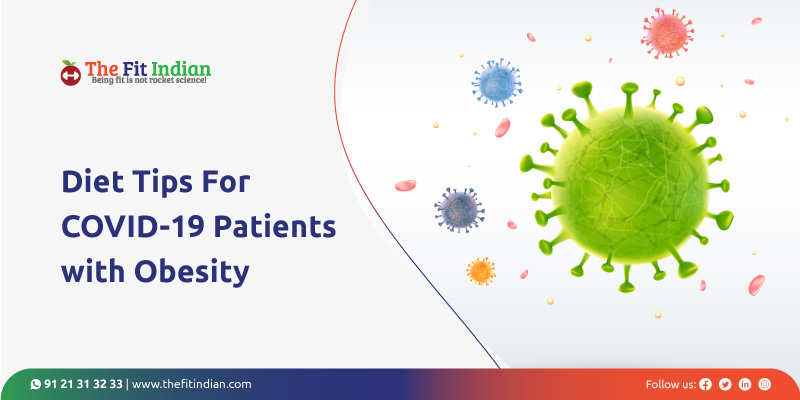
We have divided the guidelines into two parts; diet tips to improve immunity in COVID-19 patients and for good recovery post-COVID-19.
A) Tips to Improve Immunity in COVID-19 patients
Consume a moderate amount of carbohydrates, fats, good proteins in small meals in a day. Additionally, drink herbal tea and soups.
Benefits:
- Immune protection
- Protection against diseases
- Reduction in severity of illnesses
B) For Good Recovery from post-COVID-19
What to Eat and Drink: Almonds, walnuts, lean proteins, lentils, all beans family, fruits and vegetables, water, herbal tea and soups.
Benefits:
- Long-term immune protection
- Protection against diseases
- Reduction in severity of illnesses
The coronavirus pandemic has underlined the importance of being healthy and keeping your weight under control. People with obesity and related conditions have suffered severe consequences. So, follow these guidelines and also manage your weight.
Takeaway
Obesity is a complicated condition, and so are dietary modifications for obesity management. Diet is the most critical factor to tackle this condition successfully. Getting the right diet plan may be a challenge; hence, you can get the assistance of a dietician or a nutritionist to guide you. The next step is to follow the plan with dedication and consistency. Understanding how different food and exercise impact your weight is also crucial. Combine this diet plan with an exercise regimen for a potent weight-loss plan. While surgery and medications are options, it is always better to lose weight through natural methods.
FAQ’s
1. How to get rid of obesity?
Getting rid of obesity is not an easy task. But with consistent effort, you can reduce considerable weight. The following steps may help you combat the condition:
- Regular exercise
- A change in diet – talk to a nutritionist for guidance
- Create a diet and workout plan
- In certain cases, medications or surgery may be required
2. How to lose weight with diet changes?
- Consume more fibre
- Avoid or limit packaged and processed foods
- Limit alcohol intake
- Avoid eating late at night
- Stop skipping breakfast
- Reduce portion size
- Have control over cravings
- Consume less processed sugary foods
3. How to reduce obesity by exercise?
Exercising is one of the most effective ways to reduce weight naturally. You can walk, run, jog, skip, swim, hike or do weight resistance training to reduce weight. Create a plan, maintain a strict schedule, and ensure that you get at least 30 minutes of exercise every day. You can get in touch with a fitness expert to come up with a proper plan.
4. How to control obesity?
Assess your weight regularly, avoid alcohol and smoking, engage in physical activity including regular aerobic exercise, balance your calorie intake, prepare a diet plan, talk to a nutritionist and follow the health tips consistently.
5. How to overcome obesity?
To overcome obesity, you must change your dietary and lifestyle habits. A sedentary lifestyle and unhealthy food habits are two vital factors that lead to obesity. Control your calorie intake, exercise more often and follow a healthy diet plan and your doctor’s advice.
6. How to change your diet for better health?
You can consult a dietician or a nutritionist to create a proper diet plan customised for your requirements. Try replacing or substituting unhealthy foods with healthier ones, like consuming healthy fats instead of unhealthy ones. Simple changes in your diet can be highly beneficial.
7. How can we control obesity?
You can control obesity by following a healthy diet and workout program. Follow a balanced diet, avoid junk food, sugar and unhealthy fats. Stay physically active and keep an eye on your weight.
8. How are diets and exercise used to treat obesity?
Diet and exercise are the two most essential steps in the successful management of obesity. By lowering calorie intake and engaging in regular physical activity, you can reduce a considerable weight. You can also assess your BMI (Body Mass Index) regularly to see the results.
9. How does dietary modification help you lose weight?
Reducing your calorie intake and combining it with regular moderate to intense exercise can help you lose significant weight. Replacing unhealthy foods with healthier alternatives is a simple dietary modification for obesity management.
10. Can a healthy diet and exercise help with obesity?
A healthy diet along with exercise can help burn calories and burn excess fat. It can also help manage and even reverse other conditions such as hypertension and diabetes.




Manoja Kalakanti